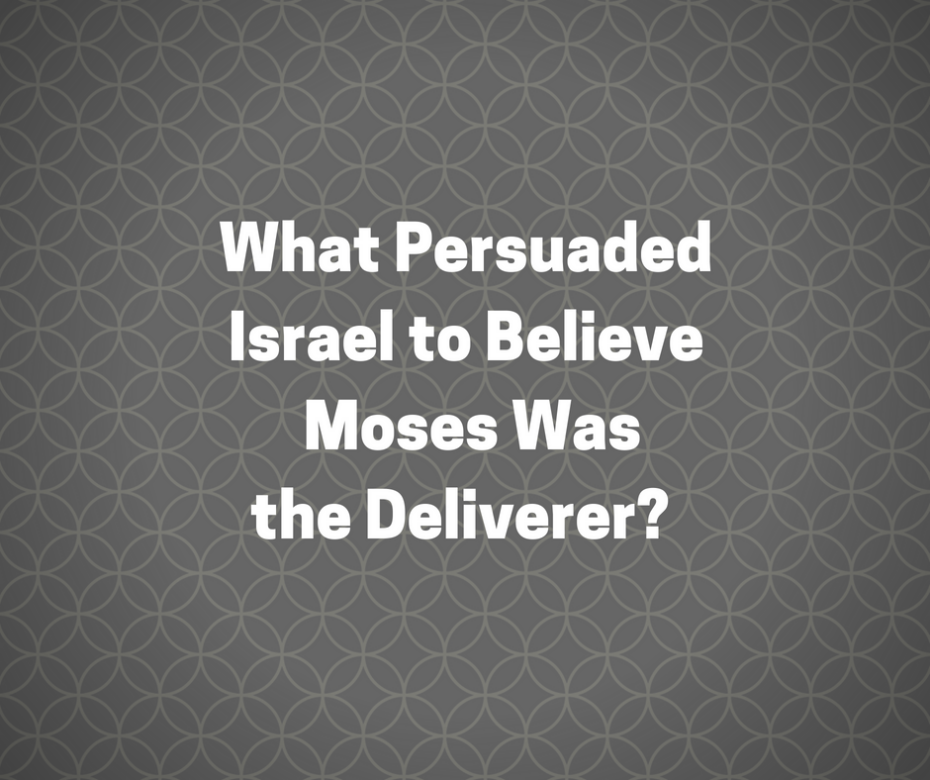Many have suggested that Moses was a type of Christ. That is, as he delivered Israel from bondage in Egypt, so the Lord Jesus will deliver Israel from bondage to Gentile domination. Of course, Jesus’ deliverance is both physical and spiritual. He will not only bring the kingdom for Israel, He gives everlasting life right now to all who believe in Him.
The expression the new Moses has often been used of the Lord Jesus Christ for this very reason. Remember that Moses wrote in Deut 18:15, “The Lord your God will raise up for you a Prophet like me from your midst, from your brethren. Him you shall hear…” He was speaking about the Messiah.
I was reading Exodus 4-5 this morning. I noted Moses’ concern: “But suppose they will not believe me or listen to my voice; suppose they say, ‘The Lord has not appeared to you’” (Exod 4:1). Then the Lord gave Moses a sign. When he cast his staff on the ground, it became a snake. But when he grabbed its tail, it became his staff again. The Lord gave this sign “that they may believe that the Lord God of their fathers…has appeared to you” (Deut 4:5). He also gave Moses two other signs so that they would believe He had been sent from God to deliver Israel. He could put his hand inside his tunic and it would come out leprous. He could put it inside his garment again and it would come out restored. In addition, he could take water from the Nile and pour it out on the land as blood.
In the Gospel of John we see that God gave at least eight signs, starting with Him turning water into wine and culminating in Him dying on the cross and rising bodily from the dead. The purpose of these signs was so that the people might believe that Jesus is the promised Deliverer (cf. John 20:30-31). Just as signs Moses did resulted in belief in him, so signs which Jesus did resulted in belief in Him. Of course, far less people believed in the Lord Jesus than believed in Moses. But in both cases signs resulted in belief.
It hit me that belief in Moses was just that. It was belief that the Lord God appeared to him and sent him to deliver the nation. It was not commitment. It was not surrender. It was not a promise to obey. It was persuasion.
And belief in Moses, like belief in Jesus, was not guaranteed to last. When the Egyptians stopped giving the Jews straw to make bricks, the people cried out, “Let the Lord look at you and judge, because you have made us abhorrent in the sight of Pharaoh and in the sight of his servants, to put a sword in their hand to kill us” (Exod 5:21). Of course, even after the ten miraculous plagues, the exodus from Egypt, the parting of the red sea, and the miraculous manna, the nation stopped believing that Moses was the deliverer. When they came to Kadesh Barnea, they listened to the ten unbelieving spies (Numbers 13-14). Among those over age 20, only Joshua and Caleb remained believing. They actually said, “Would it not be better for us to return to Egypt?” (Num 14:3). They then said to one another, “Let us select a leader and return to Egypt” (Num 14:4)!
The problem was the people stopped believing in Moses. So they had to wander in the wilderness for forty years. All those twenty years and older died during those forty years.
So why is there all this opposition today to the free gift of everlasting life received by faith alone in Christ alone?
Let’s face it. Many people do not want everlasting life if the condition is simply faith in Christ (John 5:39-40). But, since it has become popular in Christianity to affirm justification by faith—even Roman Catholics do so today—many have changed the meaning of faith. No longer is believing in Jesus about believing in Him. It is about promising to serve Him. It is about following Him. It is about turning from our sins. It is about wanting a new way of life. It is about persevering in good works until we die.
But as with Moses and the signs he did, belief in the Bible has always been persuasion. The Jewish people in Egypt were persuaded by the signs which he did that the Lord had met with him and had sent him.
The signs which Jesus did persuaded some in Israel that He was indeed sent by God as the Messiah (John 5:24ff; 6:35ff).
Jesus is the new Moses. The evidence is overwhelming. The Lord Jesus is the Christ, the Son of God (John 11:25-27; 20:31). If you believe that—if you are persuaded that is true, in the Biblical sense of guaranteeing everlasting life to the believer (John 11:25-27), then you have everlasting life which can never be lost.
Believe. In. Jesus. It is that simple.


